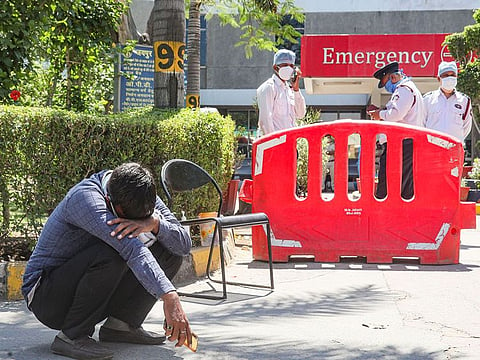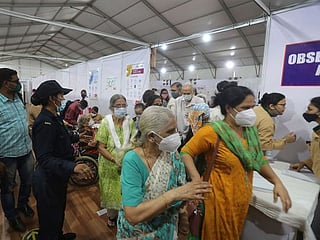Record deaths as India's affluent in cities hit by deadly COVID-19 ‘tsunami’
Urban affluent which managed to evade the first wave of COVID-19 is badly hit this time

Mumbai: India's devastating new wave of infections appears to have landed on its urban affluent, a group whose lives are usually insulated from the country's worst economic and social crises.
In Mumbai, India's financial center, almost 600,000 households are in buildings that have been partially or completely sealed by government authorities, which indicates the coronavirus is spreading rapidly among the city's middle and upper middle classes. Official data show 164,000 slum households are in areas demarcated as "containment zones," despite the poor being packed in far more tightly.
"Most cases are coming from buildings and high rises and not slums," Suresh Kakani, Mumbai's deputy municipal commissioner, said by phone.
The country reported a record 346,786 new infections and 2,624 deaths on Saturday.
With this, India has become the new pandemic hotspot - queues of Covid-19 patients and their fearful relatives have built up outside hospitals in major cities - and acute shortages of oxygen have been reported from all over the country.
A surge blamed on a new virus variant and recent "super spreader" public events has wrought devastation on the country of 1.3 billion, with charities forced to set up makeshift funeral pyres in a bid to reduce the strain on crematoriums.
Indian social media and WhatsApp are white-hot with volunteer calls for vacant ICU beds and medicine and the central government is scrambling to organise special trains to get oxygen supplies to worst-hit cities.
Consuming class ravaged
With the so-called consuming class ravaged by the new wave, India's growth is at risk because private consumption accounts for about 60% of India's economy. The central bank's consumer confidence survey is showing increasing pessimism on jobs and policy makers have said they stand ready to support growth in what is now the world's epicenter of the pandemic.
"Times are such that people are seeking help from every quarter possible," said Ajay Bagga, a retired banker and fund manager, who is helping vet claims on social media from groups purporting to supply the Covid treatment remdesivir. "Trader chatrooms are no more exclusive to market discussions. People are sharing information on hospital beds, oxygen supplies."
The affluent cities of Mumbai and Pune account for almost 30% of Maharashtra state's active cases while housing 14% of its population. Within Mumbai, more than 90% of all active cases at the state of the week were concentrated in high-rise buildings while only 10% came from the slums, according to an Indian Express analysis.
Similar stories everywhere
Comparable data isn't available for other Indian cities but similar stories abound. Bankers are turning to Twitter to seek medical help for their friends and family, tycoons are advising people to keep their masks on even in the presence of trusted folks, and citizens who, until now, enjoyed levels of privilege unthinkable for the vast majority of Indians, are pleading for hospital beds and oxygen.
One reason why the second wave is hitting wealthier Indians hard is simply that they managed to avoid the first outbreak by sheltering at home when Prime Minister Narendra Modi announced a strict lockdown that devastated poorer communities.
The first wave coursed through India's crowded slums quickly - serological surveys conducted mid-2020 showed about half the population in Mumbai's slums had antibodies compared with less than 20% for the rest of the city. This might now be providing a level of protection against the second, deadlier outbreak for disadvantaged populations.
Flight suspensions
Several countries have suspended flights from India or imposed travel restrictions, including the United Arab Emirates, Canada, Singapore, and the U.K. The U.S. is consulting with India about a surge in coronavirus cases and deaths but so far isn't offering to share vaccines.
Doctors Without Borders is restarting its emergency response amid the surging wave in Mumbai, the international medical aid group said in a statement on Friday.
Hospitals turn away patients in COVID-19 'tsunami'
Overwhelmed hospitals in India begged for oxygen supplies as coronavirus infections soared again overnight, setting a new world record for cases for the third consecutive day. Max Healthcare, which runs a network of hospitals in north India, tweeted that it had less than two hours of oxygen left while Fortis Healthcare, another big chain, said it was suspending new admissions in Delhi. "We are running on backup, waiting for supplies since morning," Fortis said. India is in the grip of a rampaging second wave of the pandemic, hitting a rate of one COVID-19 death in just under every four minutes in Delhi as the capital's underfunded health system buckles. The government has deployed military planes and trains to get oxygen to Delhi from the far corners of the country and overseas including Singapore. The number of cases across the country of around 1.3 billion rose overnight by 346,786, the Health Ministry said, for a total of 16.6 million cases, including 189,544 deaths.
Private companies should be involved from the start when India opens its vaccination program to all adults on May 1, the Confederation of Indian Industry said in a statement. The industry body has formed a taskforce under T.V. Narendran, Tata Steel Chief Executive Officer, and Randeep Guleria, director of the All India Institute of Medical Sciences.
The taskforce highlighted issues related to liability and compensation of stakeholders involved in the inoculation process, and has also drawn up priority lists to "get the workforce back to work."
"We are calling it a wave, it is actually a tsunami," the Delhi High court said on Saturday, according to the Press Trust of India. The court was asking Prime Minister Narendra Modi's administration about its preparedness to deal with the expected Covid-19 second wave peak in mid-May.
Central government blamed for inaction
Stung by criticism of its lack of preparation ahead of the wave of infections, the central government has organised special trains to get oxygen supplies to the worst-hit cities.
The Indian air force was also being used to transport oxygen tankers and other supplies around the country and to bring oxygen equipment from Singapore.
The government has also pressed industrialists to increase production of oxygen and life-saving drugs.
One 'oxygen express' carrying 30,000 litres for hospitals arrived in Lucknow, Uttar Pradesh state, where armed guards were waiting to escort trucks that would carry the oxygen to hospitals.
Indian COVID-19 variant found in Switzerland
GENEVA: A first case of the COVID-19 variant contributing to the exploding outbreak in India has been detected in Switzerland, the public health authority said Saturday. "The first case of the Indian variant of COVID-19 has been discovered in Switzerland," Switzerland's Federal Office of Public Health said in a tweet, adding that the virus variant had been found in a person transiting through one the country's airports.
Lucknow has been one of the worst-hit cities, with hospitals and crematoriums inundated with patients and bodies. Officials said the liquid oxygen would only be enough for half a day's needs.
Uttar Pradesh, a state of 200 million people, has imposed a weekend lockdown in a bid to curb the spread.
In Delhi, the city government said it would begin setting up buffer stocks of oxygen.
Delhi chief minister Arvind Kejriwal said "the government should take over all oxygen plants through the army".
Many patients are dying outside hospitals in the capital because of the lack of beds and oxygen.
Linde India, Tata get 24 cryogenic containers
Industrial and medical gas manufacturer Linde India said on Saturday it has secured 24 cryogenic containers, in partnership with Tata group for carriage of medical oxygen, from international sources.
These containers have arrived by airways to eastern part of India from where Linde will be transporting them to their liquid oxygen manufacturing facility, it said in a statement.
"At the Linde facility, these cryogenic ISO containers will be conditioned and certified for liquid medical oxygen usage. Each of these containers which can carry up to 20 tonnes of liquid O2 will be used by Linde to pick-up oxygen from various manufacturing facilities and deliver it to hospitals where required."
These ISO containers can also act as interim oxygen storages in remote areas which are facing oxygen scarcity, said the company.
Since the onset of the pandemic, Linde said it has been committed to finding innovative solutions and partnering in ventures that enable faster supply of medical oxygen.
"From partnering with the government to airlift cryogenic road tankers from Delhi for filling liquid oxygen at Linde's oxygen plant in Durgapur and get the much-needed medical oxygen to Delhi to working with Indian Railways to ferry empty tankers on the 'Oxygen Express' from Kalamboli, Maharashtra to Vizag, where the tankers will be filled with liquid oxygen and sent back to Maharashtra."
Sign up for the Daily Briefing
Get the latest news and updates straight to your inbox








